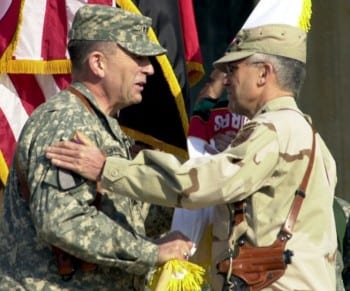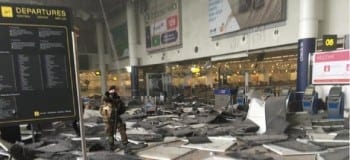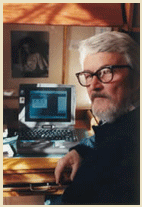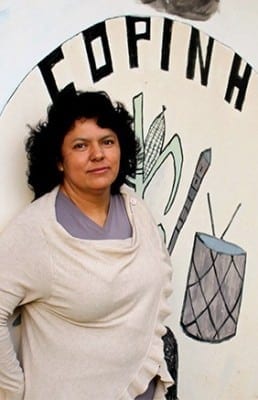21 Generals Lead ISIS War the U.S. Denies Fighting
//
=By= Nancy A. Youseff

Gen. George Casey, center, the commander of all U.S. forces in Iraq, hands the flag of Multi-National Corps-Iraq to Lt. Gen. Ray Odierno, commander of the U.S. Army’s III Corps, during a transfer of authority ceremony Thursday at Camp Victory in Baghdad. At right is Lt. Gen. Peter W. Chiarelli, the outgoing commander of MNC.
Matt Millham / S&S
[dropcap]I[/dropcap]n the war against the self-proclaimed Islamic State, the U.S. military is notably short on soldiers, but apparently not on generals.
There are at least 12 U.S. generals in Iraq, a stunningly high number for a war that, if you believe the White House talking points, doesn’t involve American troops in combat. And that number is, if anything, a conservative estimate, not taking into account the flag officers running the U.S. air war, the admirals helping wage the war from the sea, or their superiors back at the Pentagon.
At U.S. headquarters inside Baghdad’s fortified Green Zone, even majors and colonels frequently find themselves saluting superiors at a pace that outranks the Pentagon and certainly any normal military installation. With about 5,000 troops deployed to Iraq and Syria ISIS war, that means there’s a general for every 416 troops, give or take. To compare, there are some captains in the U.S. Army in charge of that many people.
Moreover, many of those generals come with staffs and bureaucracy that some argue slows decision-making against an agile terror group.
The Obama administration has frequently argued that the U.S. maintains a so-called light footprint in Iraq to reassure the American public that its military is not back in Iraq. Indeed, at times, the United States has not acknowledged where it has deployed troops until one of them died.
But if the U.S. footprint is so small, why does the war demand so many generals?
There is the three-star general in charge of the war, Army Gen. Sean MacFarland, and his two deputies, one of whom is in Iraq at any given time. There is the two-star Army general in charge of the ground war, Army Maj. Gen. Gary Volesky, and his two deputies, who also travel between Iraq and Kuwait. There is the two-star general in charge of security cooperation—things like military sales—and his deputy.
Then there are the one-star generals in charge of intelligence, operations, future operations, targeting, and theater support.
There also are an untold number of Special Forces commanders in the battlefield whom the military does not speak publicly about; the dozen figure presumes at least one one-star Special Forces general.
And that is just the beginning of the top-heavy war fight. That figure doesn’t include the bevy of generals stationed in places like Bahrain, Kuwait, and Qatar to support the mission. Nor does it count the three-star Air Force general and his two-star deputy in charge of U.S. Air Forces Central Command, which is headquartered at Shaw Air Force Base, South Carolina. Then there is a three-star Marine in charge of Marine Corps Forces Central Command, based out of MacDill Air Force, Florida, and his deputy and their Navy counterparts. All three commands are responsible for the Middle East.
Finally, there are a number of generals from the other roughly 60 coalition countries. The Daily Beast knows of three who support the U.S. generals—from Australia and the United Kingdom.
Once all those additional generals are included, there are at least 21 flag officers in Iraq, a number even military officials concede is conservative, as there likely are other coalition generals and possibly other Special Forces commanders.
Officially, there are only 3,870 U.S. troops, or the equivalent of a heavy brigade, which is usually led by a colonel. One colonel.
As The Daily Beast first reported, however, there are actually more than 5,000 troops, still far short of a footprint that would usually demand a score of generals.
Defense officials defended the deployment of so many generals to The Daily Beast. In a war where there are so many different types of fighters, these officials said, you need generals to coordinate. Today’s warfighter is more lethal, thanks to improved technology, and therefore needs a commander with the appropriate authority to sign off authority on the use of that power. The intelligence reaching the front lines is so complex, it demands the talents of a one-star general, defense officials argued to The Daily Beast.
(Of course, it’s odd to brag about such lethality when the Defense Department has said repeatedly that American troops were “not in an active combat mission” in Iraq.)
These officials also say it is only fitting that Iraqi military leaders engage with a U.S. counterpart of the same rank.
“When you look at what they do and what they are in command of and how they provide support, I think it is justifiable,” one defense official explained to The Daily Beast.
Some defenders offer a more simplistic answer—the U.S. military has always used this structure to deploy generals to places like Iraq.
There are as a rule two types of generals in the U.S. military—those who command troops and those who support the fight. The military argues that in Iraq, the U.S. needs far more of the latter than the former. The Iraqi troops, led by Iraqi generals, should shape the front lines, they said.
But critics argue that such dependency on U.S. generals in areas outside the battlefield not only suggests a lack of Iraqi skills but also obfuscates the U.S. effort.
“Having this many generals and flag officers gives the appearance of commitment without the substance of commitment,” Christopher Harmer, a naval analyst at the Washington-based Institute for the Study of War, explained to The Daily Beast.
After World War II, the Vietnam War, and the Cold War, the U.S. military downsized its rank and file troops but did not shrink the size of its general and flag officer corps proportionally. The result is a long-standing criticism of a top-heavy military that some argue is costly and not as effective.
A May 2013 U.S. Government Accountability Office report, for example, concluded that “mission and headquarters support-costs at the combatant commands more than doubled from fiscal years 2007 through 2012, to about $1.1 billion.”
Several past defense secretaries have tried to cut the number of generals. Former Defense Secretary Chuck Hagel tried to reduce the number of general officers and civilians by 20 percent but wasn’t on the job long enough to make it happen. Robert Gates, the defense secretary during the peak of the wars in Iraq and Afghanistan, proposed eliminating 50 generals and admirals.
If Gates’s efforts succeeded, it is not obvious in today’s military. In addition to all those generals in the Middle East, there are dozens of others at U.S. Central Command in Tampa, which is in charge of the Middle East, and at the Pentagon who also support the U.S. effort in Iraq and Syria—so many that it is impossible to say just how many generals are part of the U.S. war effort.
On Wednesday, two of the leading four-star generals of the war stateside took new command positions. Army Gen. Joseph Votel, the outgoing special operations commander, became the new head of U.S. Central Command, which oversees the Middle East. Army Gen. Raymond “Tony” Thomas is Votel’s special operations replacement.
Soon, they’ll be visiting the front lines in Iraq—and adding to the number of American generals on the ground in the ISIS war.
Note to Commenters
Due to severe hacking attacks in the recent past that brought our site down for up to 11 days with considerable loss of circulation, we exercise extreme caution in the comments we publish, as the comment box has been one of the main arteries to inject malicious code. Because of that comments may not appear immediately, but rest assured that if you are a legitimate commenter your opinion will be published within 24 hours. If your comment fails to appear, and you wish to reach us directly, send us a mail at: editor@greanvillepost.com
We apologize for this inconvenience.
 Nauseated by the
Nauseated by the
vile corporate media?
Had enough of their lies, escapism,
omissions and relentless manipulation?
Send a donation to
The Greanville Post–or
But be sure to support YOUR media.
If you don’t, who will?












 Andrew Korybko is a political analyst, journalist and a regular contributor to several online journals, as well as a member of the expert council for the Institute of Strategic Studies and Predictions at the People’s Friendship University of Russia. He specializes in Russian affairs and geopolitics, specifically the US strategy in Eurasia. His other areas of focus include tactics of regime change, color revolutions and unconventional warfare used across the world. His book, “Hybrid Wars: The Indirect Adaptive Approach To Regime Change”, extensively analyzes the situations in Syria and Ukraine and claims to prove that they represent a new model of strategic warfare being waged by the US.
Andrew Korybko is a political analyst, journalist and a regular contributor to several online journals, as well as a member of the expert council for the Institute of Strategic Studies and Predictions at the People’s Friendship University of Russia. He specializes in Russian affairs and geopolitics, specifically the US strategy in Eurasia. His other areas of focus include tactics of regime change, color revolutions and unconventional warfare used across the world. His book, “Hybrid Wars: The Indirect Adaptive Approach To Regime Change”, extensively analyzes the situations in Syria and Ukraine and claims to prove that they represent a new model of strategic warfare being waged by the US.
